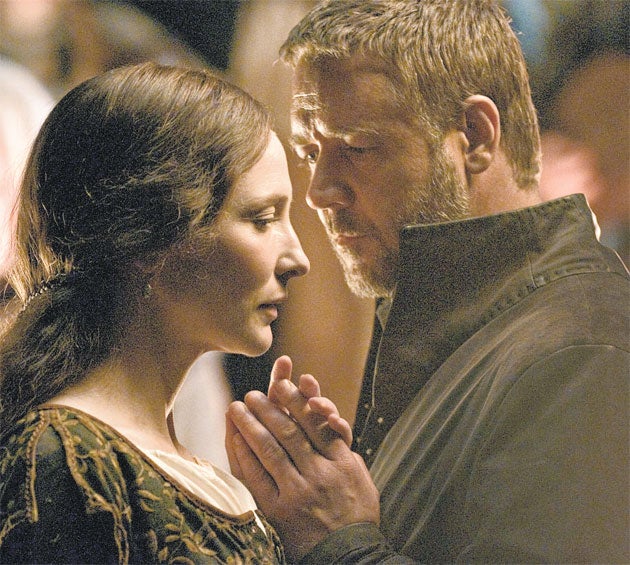Robin Hood, Ridley Scott, 140 mins (12A)
Robbed of all his merriment

The stocky figure, the venerable beard, the humourless brow, the hair brushed forward: hmm, we've met this fellow before. Considering the previous high-profile incarnation of Robin Hood was American-accented and mullet-headed, I suppose anything Russell Crowe did would seem a model of authenticity next to Kevin Costner.
Yet aside from swapping his Roman breastplate for mediaeval chainmail, you can barely tell the difference between Crowe as Hood and Crowe as Maximus in Gladiator. The latter, now all of 10 years ago, marked the first and most successful collaboration between the actor and the director Ridley Scott. Perhaps that's why this new film, their fifth together, keeps quoting visually from Gladiator, in the hope that audiences will buy it as a brand.
There is something different about Crowe, in fact: his accent. It's quite a hotchpotch, blending Mancunian, Yorkshire and bit of Northern Irish into something intended to convey an honest yeoman of the 12th-century Midlands. But that idea of someone making himself up is actually germane to the film. Robin Hood, written by Brian Helgeland, is more of a creation story than the traditional picture of the backwoods outlaw. You will see in it no Lincoln green, let alone the eye-popping Technicolor of Errol Flynn's costume; no fight on the bridge with Little John; no archery contests; no crashing portcullises or escape to Sherwood Forest; no Norman knight curling his lip and demanding blood. Indeed, for the first half-hour or so we are invited to wonder whether Crowe is "Robin Hood" at all.
He is introduced to us as one Robin Longstride, lusty bowman of an English army returning through France after 10 years' hard slog in the Holy Land. Asked by his king, Richard the Lionheart (Danny Huston), for an honest view of the crusade, Robin gives it to him straight (ie straight from a 21st-century liberal perspective): they murdered many innocent Muslims. Too honest – the king proves more of a Lyin' Heart by clapping him in the stocks. But a chance for redemption follows when, on the death of Richard, Robin and three of his not-so-merry men interrupt an ambush, and manage to rescue the late king's crown, now en route to Richard's heir in London. Too bad it's his petulant, dissolute brother John. That's not the only thing Robin takes back to England: having promised to return the sword of a dying knight, Robert Loxley, to his ancestral home, Robin also assumes his identity.
This brings him to the front door of the late knight's father, Walter (Max von Sydow) and – result! – the bedchamber of his widow, the Lady Marian (Cate Blanchett), who between them decide that it's better for Robin to continue his imposture as Lord of the Manor so as to offer the Loxley land much-needed protection from its enemies. And thus does romance bloom twixt Robin and Marian, soundtracked not by Bryan Adams (thank God) but, no less mystifyingly, a whole ceilidh-full of Irish folk tunes, this being Hollywood's preferred musical signifier of honest tribal camaraderie (see also: Titanic). Hardly an evening goes by chez Loxley without some firelit folk gathering of local peasants, all bewitched by the sound of swirling Celtic pipes; the star couple's big number is actually a variation on "The Women of Ireland", which was the love theme of Kubrick's Barry Lyndon. Would it have killed the film's researchers to have sought out some English folk music for the occasion?
I didn't mind Blanchett and Crowe together, to tell the truth; they are too accomplished as actors to let themselves or the film down. But there is nothing either of them can do to raise the standard above so-so. Robin Hood is undermined by plotting so vague that we hardly know whom we ought to be booing. Its very first scene involves an attack on the Loxley estate by a gang of "feral children", thus named in the credits, though their tatty presence goes unexplained thereafter. The film cannot settle on one baddie, so gives us a whole parade of them. First, there's rapacious King John (Oscar Isaac), who intends to tax his poor subjects to death. He sends out his ruthless French hireling Godfrey (Mark Strong) for that purpose, little realising that the Frenchie plans to orchestrate an invasion of England on behalf of his own King Philip. There's also a Sheriff of Nottingham, played by Matthew Macfadyen but featured so fleetingly you might think the filmmakers were mindful of the last time this character appeared: Alan Rickman got all the best lines in the 1991 film and, it was clear, had stolen not only taxes from the Nottingham peasantry, but the entire show from Costner's Hood. Macfadyen was probably aware that this would not happen again.
While we can praise Ridley Scott for his stamina – into his seventies and still turning out a film a year – it must be said that his work looks more run-of-the-mill than ever. The visionary of Alien and Blade Runner has given way to a sober journeyman who, having prompted so many imitators, now filches from others. Prepare yourself for echoes here of Braveheart, Troy and Saving Private Ryan. It's not a bore, but it's very far from exciting, and the fact that it ends where most Robin Hood films begin raises the horrible possibility of a sequel. Its happy envisaging of social justice and fair taxation resonate in this of all weeks. "Nobody rich, and nobody poor," says Marian in voiceover – just more Robin Hood economics, then.
Join our commenting forum
Join thought-provoking conversations, follow other Independent readers and see their replies
Comments